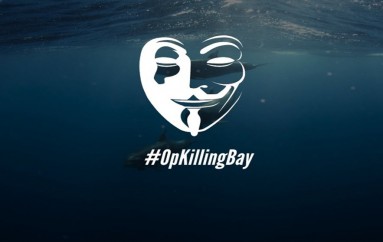
School Of Hacking: Inside The Dark Web Virtual Classroom Where Anonymous Wants To Become Great Again
Last Sunday night, in the darkest corners of the internet — where no one knows your name or what you look like — 250 people from across the globe fired up their anonymous Tor browsers, connected to the dark web and logged into an internet relay chat network called OnionIRC.
These people were not there to buy drugs or trade child pornography. They were there to learn to how to hack — without getting caught. And they were also there for a more altruistic purpose: to help Anonymous, the hacker collective whose reputation has suffered recently, once again become a force for good.
“This course will cover many topics, all relevant to privacy, security, and anonymity,” said “Athena,” one of the instructors, as the lesson kicked off.
Over the next two hours Athena, along with another instructor called “Tyche,” gave detailed instructions on how to use the Tor browser, encrypt a hard drive and discuss the pros and cons of using a VPN (virtual private network). They answered questions from those seeking to learn, and finished by promising to do “something more fun” in the next lesson.
This is the dark web hacking school that some members of the Anonymous community hope will help change perceptions of a group seen by broader hacking communities as a joke; by the media as an easy way to generate attention-grabbing headlines; and by the general public as a nuisance rather than a credible activist organization seeking to change the world for the better.
In the years since Anonymous emerged from the shadowy corners of 4Chan — the internet image board where Rickrolling was spawned and, more recently, the Fappening started — it has morphed beyond recognition from a group of trolls looking for laughs (or lulz) to a social movement that aims to right wrongs and highlight inequality.
Since 2011 and the high-profile attack on Sony Pictures, together with attention-grabbing campaigns against PayPal, the Church of Scientology, the Islamic State group (aka ISIS) and the Ku Klux Klan, the number of people affiliated with Anonymous has grown rapidly. But this has not necessarily been a good thing.
“So, here Anonymous lies, with swelling numbers and a lowered average technical understanding of hacking, not to mention a very low bar for activism.” This is how one so-called “Anon” responsible for setting up OnionIRC describes the current state of Anonymous, adding that the group as a whole “has become a laughingstock. To the average hacker, Anonymous is a joke.”
Speaking to International Business Times, the Anon says the group behind the project came together to try to restore some order and help those attracted to the Anonymous movement learn the skills that can shield them while they attack their targets.
Some have been part of Anonymous since the beginning, while others are new to the group. Some members previously ran the Blackhat Academy and School4Lulz, projects similar in scope to the current effort. “OpSec and being Anonymous is a 24/7 job,” Tyche said during Sunday’s opening lesson, and true to their word, the hacktivists behind the project would not reveal details about themselves for fear of being identified or linked to previous actions.

OnionIRC will not be an online rallying point for new operations, the organizers say, but if users want to coordinate their own project within the network then they won’t be stopped. The group says it will hold one main lesson per week and there is no limit to what type of lessons it will offer, with instructors happy to teach whatever those using OnionIRC want to know about. The only topic off limits on OnionIRC, they say, is child pornography.
In the past 12 months a lot of media attention has been focused on Anonymous campaigns targeting ISIS and the KKK, but according to the Anon who spoke to IBT, both the campaigns and the journalists reporting on them served only to highlight all that is wrong with Anonymous.
“The media has seemed to largely cover the lowest-hanging fruits in Anonymous,” they said. “Anonymous operations pertaining to DDoS or reporting Twitter accounts, for example, get a lot of media attention. This is good for spreading awareness of Anonymous, but it paints a false picture of what activism and hacktivism actually is.”
Those behind the OnionIRC believe the negative perception of Anonymous has been fomented by failed campaigns like Operation ISIS (or OpISIS) which “declared war on ISIS” but failed to live up to its billing, reporting Twitter accounts not related to ISIS terrorists and carrying out distributed denial of services (DDoS) attacks, which last only minutes and do little damage.
Another recent campaign to unmask KKK members was similarly problematic and due to the nature of the subject matter was overhyped in the media, with inaccurate information published and claims of hacking websites that were nothing but “lies,” according to OnionIRC’s organizers.

While some Anonymous members may blame the media for reporting information that was “widely and publicly known to be false,” one of the biggest problems for those reporting on Anonymous is the group’s complex, confusing and often contradictory nature. Lacking any sort of leadership structure and with no barrier to membership — simply declaring “I am Anonymous” is enough to become a member — there is no single voice of Anonymous, and that makes reporting on it difficult.
“The lack of structure or membership requisites leaves Anonymous open to an endless sea of nonsense,” OnionIRC’s organizers said, adding that this has its advantages as the attention that “silly or otherwise bulls— operations” get helps “to obfuscate the rest of us.”
The idea of training an army of disaffected young people in the arts of hacking may sound like a dangerous game to play, given those in charge have no idea who they are teaching. However, Lee Munson, security researcher for Comparitech, said he believes companies should not be overly concerned about a wave of newly armed Anonymous -trained criminals attacking their companies.
“In my opinion, OnionIRC could well prove to be a great recruitment ground for the collective, albeit with its share of untalented hangers-on, but it won’t be causing many CEOs to lose much in the way of sleep,” Munson told IBT.
When asked about the inherent dangers of giving powerful hacking skills to a people they don’t know, the organizers admitted there was a chance the newly acquired skills could be used for criminal activity, but it was not something they worry about: “We aim to educate, and that is what we will do. Besides, many laws are unjust and some of us behind the network would rather see every prison burned to the ground.”
Source | IBTimes





